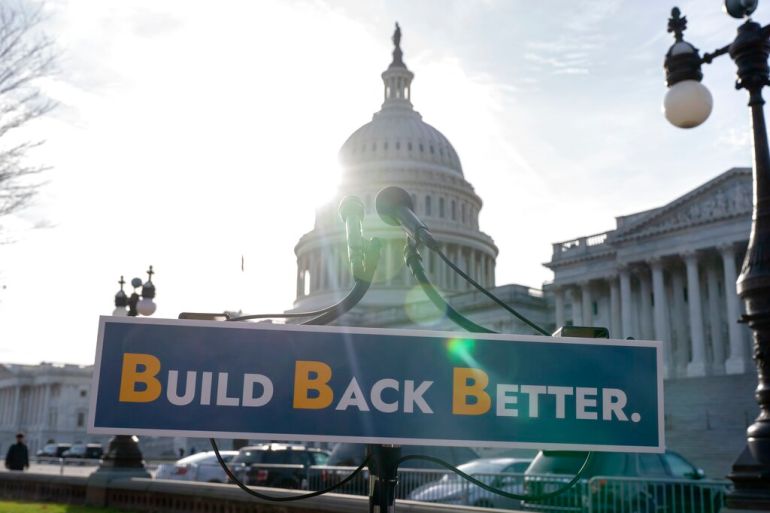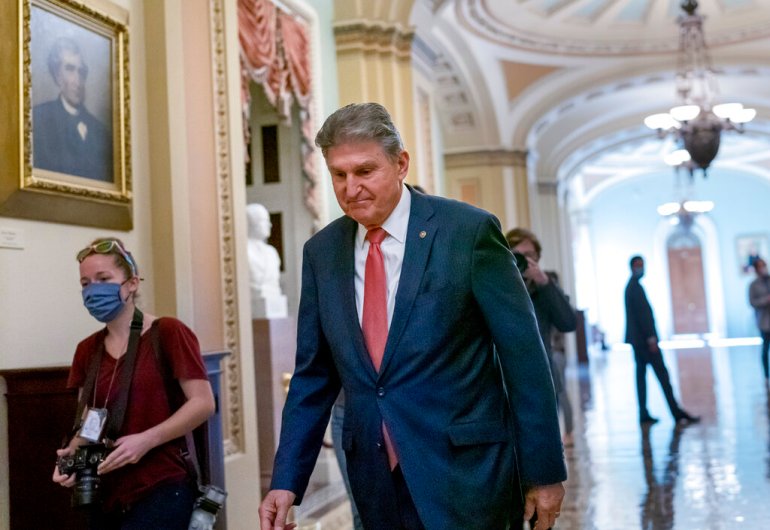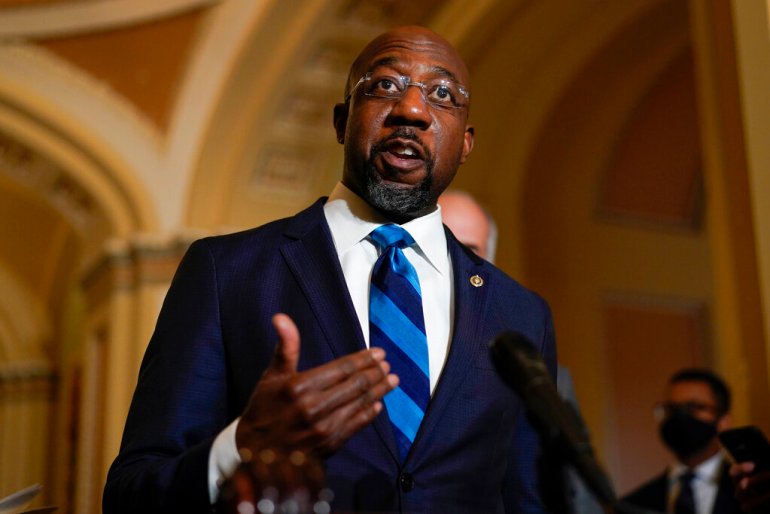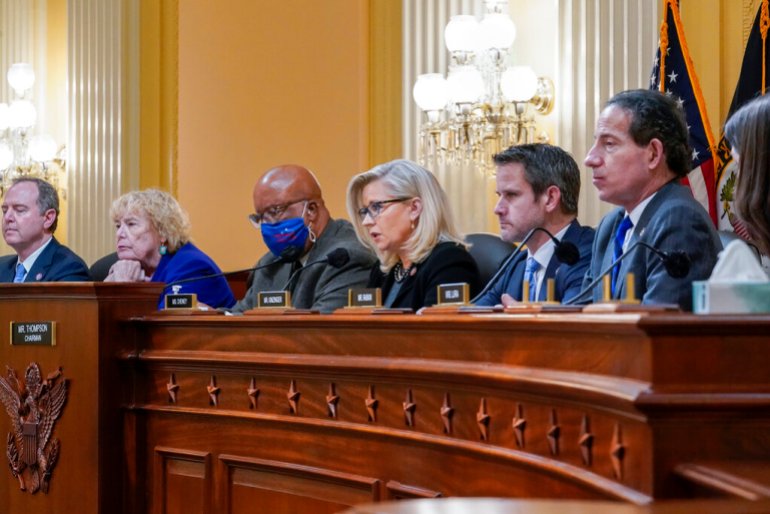What does US Congress hope to accomplish as lawmakers return?
Fate of Biden’s ‘Build Back Better’ plan, US voting reforms hang in balance as Democrats struggle for unity on agenda.

President Joe Biden’s cornerstone Build Back Better tax and spending plan remains short one vote as legislators return to work in the United States Congress Monday.
Maverick Democrat Senator Joe Manchin has refused to go along with Biden’s $1.75 trillion plan, concerned about its cost and scope.
Keep reading
list of 4 items‘Keep up the fight’: Biden pledges defence of US voting rights
‘Monumental step’: Biden hails $1 trillion infrastructure bill
US Congress seeks to compel Bannon testimony in January 6 probe
National voting rights and the January 6 riot investigation are also high on the Congressional agenda.
Democrats have a slim nine-member majority in the house, and the Senate is equally split, making the passage of major legislation difficult, especially with midterm elections looming in November.
Build Back Better
Biden sought to keep Build Back Better afloat with a December 20 one-on-one call to Manchin described as “cordial”.
Top congressional Democrats said they would continue working to pass the plan which they argue will strengthen the US middle class and combat the long-term threat of climate change.
“I had a good discussion with the President and the Speaker, where we talked about ongoing negotiations on finalising the Build Back Better Act, so we can pass it in the Senate,” Senate Majority Leader Chuck Schumer, the top Senate Democrat, reported to the Senate.
“The President requested more time to continue his negotiations, and so we will keep working with him hand-in-hand to bring this bill over the finish line,” Schumer said.

Republicans are unified in their opposition to the bill which they have characterised as out-of-control spending on social programmes that will further fuel inflation, cutting into working-class wages, and damaging the economy.
“Even if they pared this bill back, $1.5 trillion is not a moderate compromise. It’s still a massive tax-and-spend bill,” Representative Steve Scalise, the number-two House Republican, said Fox Business Network’s ‘Kudlow’ show.
The Democrats legislative push is driving independent swing voters towards Republicans “in droves because they think this is madness”, Scalise said.
Apart from politics, Democrats have policy motives to pass Biden’s signature initiative because it includes a renewal of a tax credit that benefits millions of lower-income families with children. The bill also includes new funding for childcare, early education and climate change.
Monthly payments from the child tax credit expired at the end of December.
“We are just trying to see how soon we can pass the Build Back Better legislation. It’s so important. It’s fraught with meaning,” said House Speaker Nancy Pelosi, who is using the expired tax credit as “really important leverage” in hopes of winning Senate approval of the larger bill.
Voting Rights
With progress stymied on Biden’s budget, Democratic leaders are planning to turn to voting rights. The issue is hotly contested nationally and in many states following the 2020 presidential election that former President Donald Trump refused to concede and continues to claim was rigged.
In the Senate, freshman Senator Raphael Warnock, a Democrat from Georgia, is pushing hard to advance voting rights legislation that would make it easier for Americans to vote.
Warnock has called on leaders to create a special rule to allow reform legislation to pass with a simple majority, rather than the 60 votes needed under filibuster rules.

“The warning lights of our democracy are blinking right now and we seem unwilling to respond with the same urgency to protect the democracy that we have to protect the economy,” Warnock said in a Senate floor speech.
Two Democrat-backed voting rights bills, the Freedom to Vote Act and the John Lewis Voting Rights Act, have passed the House and are pending in the Senate where opposition Republicans have blocked their passage.
“We have tried all year long to get Republicans to join us on a bipartisan effort to protect our democracy, but they have resisted and they have blocked the Senate from having so much as a debate on this issue,” Schumer said.
Senate Democrats are having detailed discussions about a potential change in Senate rules that would allow them to bypass a Republican filibuster of national reforms to voting laws.
“The voting restrictions we are seeing passed in Republican-dominated state legislatures are the most egregious assaults on voting rights since the days of Jim Crow, and they are being passed entirely on a party-line basis,” Schumer said.
Biden called the latest discussions on voting reforms “productive” and urged “we must press forward on voting rights legislation”.
January 6 investigation
In the House, partisan rancour is likely to accelerate as a Select Committee investigating the January 6 riot by Trump supporters picks up momentum.

The committee has interviewed hundreds of witnesses about what transpired in the lead up to the riot when Trump supporters overran police at the Capitol and disrupted Congress’s formal proceedings to certify Biden’s election win.
A “key question before the committee: Did Donald Trump, through action or inaction, corruptly seek to obstruct or impede Congress’s official proceeding to count electoral votes?” said Republican Liz Cheney.
It has subpoenaed dozens of Trump aides and associates as it focuses on Trump’s campaign to overturn the election results and is expected to begin high-profile public hearings soon.
It is tasked with delivering a public report of its findings before the election.
Countering China
Congress is working on major legislation to promote US production of semiconductors amid a global shortage of chips, Chinese competition and threats against Taiwan, but progress is uncertain.
“If we want to compete globally, we invest domestically, and specifically in revitalising the semiconductor industry,” Commerce Secretary Gina Raimondo said in a speech promoting the initiative at the Detroit Economic club at the end of November.
In December, a bipartisan group of senators introduced the Investing in Domestic Semiconductor Manufacturing Act, which would provide for $52bn in federal incentives for US production.
“The recent global chip shortage put American medical equipment, computer and car supply chains on hold,” said Senator Marsha Blackburn, a leading Republican sponsor of the bill that seeks to reduce US dependency on suppliers in China.